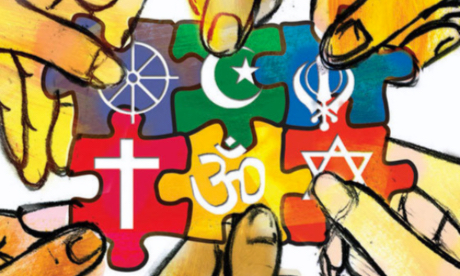Most Americans know what an atheist is and why Christians celebrate Easter, according to a recent survey by the Pew Research Center.
But only 20 percent identified Protestantism—and not Catholicism—as teaching that “salvation comes from faith alone” rather than through both faith and good works.
Only 34 percent knew that according to Catholic teaching, the bread and wine used for Communion are not symbolic but actually become the body and blood of Christ.
Perhaps more surprisingly, among Catholics themselves, only 50 percent correctly answered the question about transubstantiation, while 45 percent of Catholics said that the bread and wine in communion are only symbolic.
Some elements of Christianity were widely known: 81 percent of all Americans said that Easter celebrates the resurrection of Christ, and 79 percent identified Moses as the biblical figure most associated with leading the Exodus from Egypt.
Eastern religions were not as familiar: Only 18 percent could identify the “truth of suffering” as one of Buddhism’s “noble truths,” and only 15 percent could state that the Vedas are prominent Hindu scriptures.
The report on American religious literacy, released on July 23 by the Pew Research Center, reveals some of what Americans do or do not know about their own faiths and others.
60 percent of Americans feel “warmly” toward Catholics
“I was struck, for example, that just one in five American adults knows that Protestantism, not Catholicism, traditionally teaches that salvation comes through faith alone,” said Greg Smith, associate director of research at Pew and one of the primary researchers for the report. “I was struck that only about a quarter of Americans know that Rosh Hashanah is the Jewish New Year.”
The report was based on a survey of 10,971 respondents who answered online multiple-choice questions about religion.
Less than 1 percent of respondents got a perfect score on the 32 survey questions centered on the Bible; elements of Christianity, Judaism and other world religions; atheism and agnosticism; and religion and public life.
Jews, atheists and agnostics scored highest—with each getting answers correct more than half of the time.
Evangelical Protestants also had high scores compared with other groups.
There are a number of factors linked to people’s religious knowledge, from their education—both in academic and religious settings—to the range of individuals with whom they may socialize.
“Respondents who know other people from a wide variety of religious backgrounds tend to perform better on the survey’s questions about religious knowledge as compared with those who don’t know people from such a wide variety of religious backgrounds,” Mr. Smith said. Continue reading
- Image: Theory of Knowledge
News category: Analysis and Comment.




